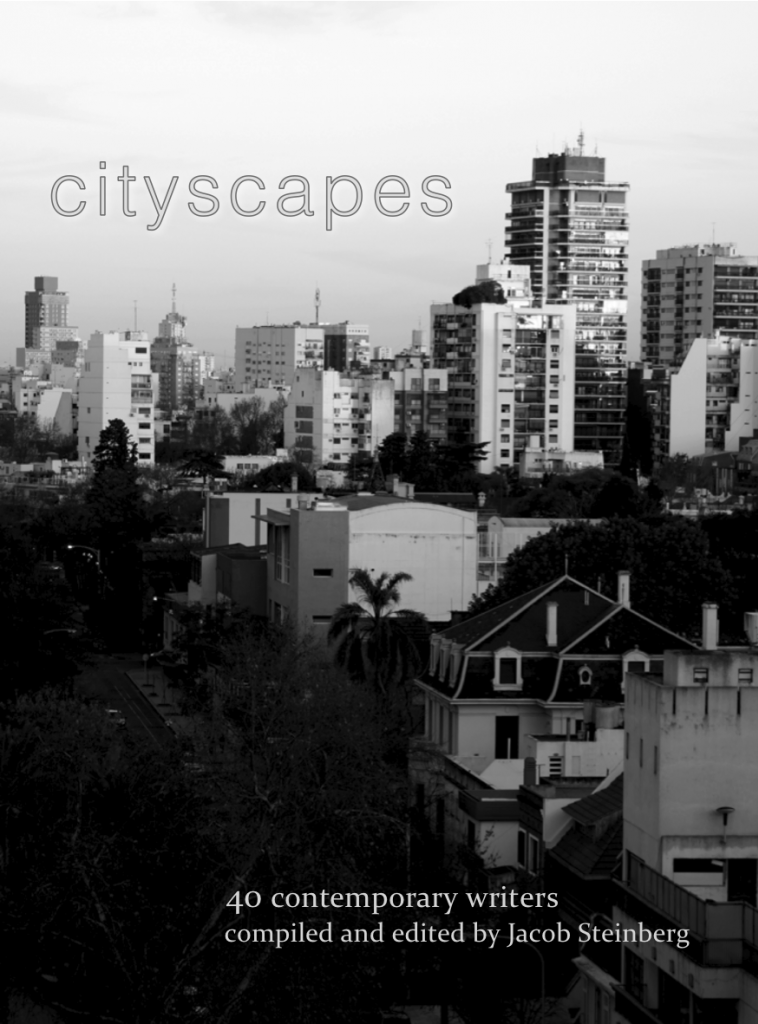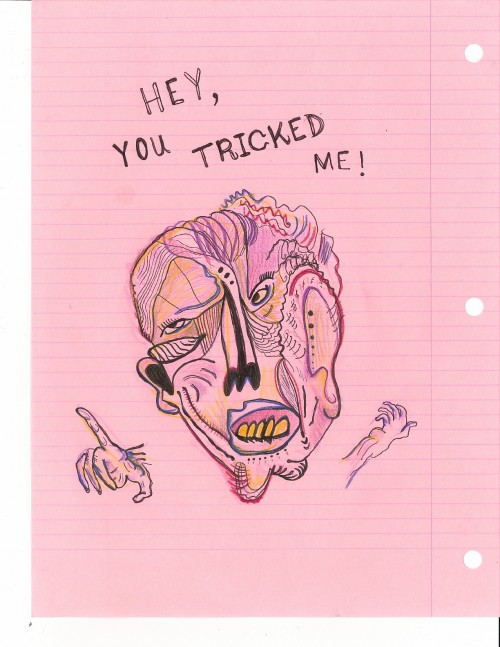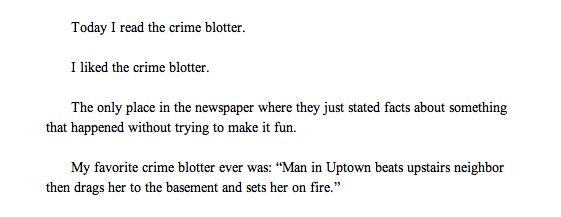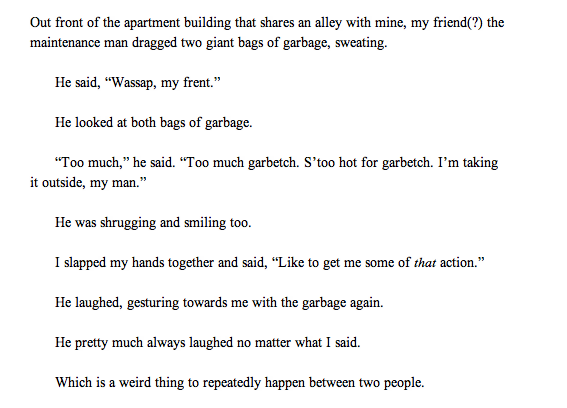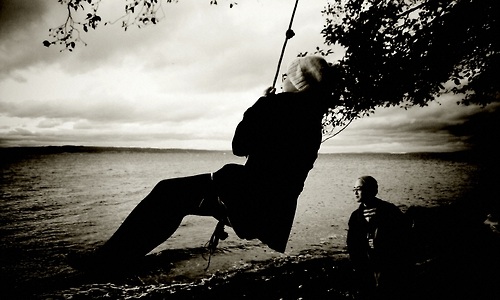Notes While Reading “Cityscapes” Anthology (Editor: Jacob Steinberg)
Cityscapes / Jacob Steinberg Prologue
Cityscapes was edited by Jacob Steinberg. Jacob goes to NYU (does he still go to NYU?). I remember he used to bro-down with Spencer Madsen and one time they did a Ustream from the beach in Florida or something. I’ve been in many Tinychats with Jacob. I like him.
Jacob mentions Julio Cortazar in his prologue. We’re both fans of Cortazar and of Clarice Lispector, not that those are rare people to be fans of, but I feel as if we’ve e-bonded over being into those authors. Jacob asked me to be in this but my piece wasn’t really about Chicago particularly. Took place on the internet.
25 Points: Thunderbird
 Thunderbird
Thunderbird
by Dorothea Lasky
Wave Books, 2012
107 pages / $16.00 buy from Wave Books
1. Wave Books made a hardcover edition of this book with a pink cover but it is sold out on their website.
2. The only time I’ve seen Dorothea Lasky read was at last year’s AWP (Chicago) where she read in a theater and everyone clapped when she read and thought she was great (I also thought this).
3. After the whole reading was over there was a dance party and Dorothea Lasky was dancing nearby and I told my friend Chris that I liked her poems and I think she heard me and I turned to her and said something like, “Sorry, I’m talking you like you aren’t in the room or something.” She just smiled because she is a nice human being and poet.
4. The title of the book and all the poem titles are typed in what seems like a medieval font–like something one would see on stained glass windows.
5. “I Like Weird Ass Hippies” is probably the funniest poem title in the book (she read it AWP).
6. “I make hell to live in / I make hell”
7. “The world doesn’t care” is a poem that tells the truth and is not complicated; everyone should read it.
8. I am listening to Allo, Darlin’ and writing this and I feel this band is a good soundtrack to Dorothea Lasky’s poems.
9. “Let’s sit in a sea of flames / And I will never put the fire / Out of you” is something I wish a woman will tell me someday when she is talking to me, not reading the poem in which Dorothea Lasky writes it.
10. A person says, “Is this America?” in a poem titled “The Room” and I think lots of poets ask this important question. READ MORE >
November 8th, 2012 / 1:01 pm
I still work, motherfucker–New Sam Pink!
Electric Literature’s Recommended Reading this week is an excerpt from Sam Pink‘s forthcoming novel, Rontel, which is coming Valentine’s Day 2013 in print form from Lazy Fascist Press (kudos to Cameron Pierce!), as well as in a digital edition via Electric Literature. EL has also posted an animation of one of the sentences:
I found the excerpt hilarious and enjoyable and good. Sam is one of my favorite authors. I assume a lot of people who come to this site already love Sam Pink or suck, but if you don’t know him, he is a very clever author, darkly comic with some other thing going on.
Some excerpts from the excerpt:
And also:
Viva Sam Pink!
25 Points: Life of Pi
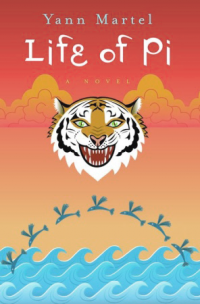 Life of Pi
Life of Pi
by Yann Martel
Knopf Canada, 2001
336 pages / $15.95 buy from Powell’s
1. Here’s a secret: I didn’t know what to think after finishing Yann Martel’s Life of Pi.
2. …I still don’t.
3. And I was baffled when I read reviews (tons of them) saying things like “omg this book will make you believe in God,” and “after reading Life of Pi, you’ll definitely never want to eat another animal again.” What the fuck? I thought I was reading a book.
4. Anyway, I guess it doesn’t help either that Ang Lee (Brokeback Mountain) has actually (finally) turned the book into a film.
5. It’s one thing for reviewers and normal people to say things (like how I am supposed to feel about the book) but when the author actually says stuff like “Yeah, this is totally gonna change your life,” in all seriousness, I feel like doing bad things to that author.
6. But Martel doesn’t actually say anything like that and I don’t really feel like I want to actually do bad things to authors or artists—ever. Really, Martel says something more like, “This book will make you believe in God…” Something like that.
7. And who the fuck do you think you are, Yann Martel? Is this how one wins the Man Booker? Because, I don’t know.
8. Confidence is one thing but this—this is just bullshit.
9. Question though (and this is relevant, maybe): If I hate this book so much, then why am I bothering to even read it? Well, it’s pretty simple. Basically, like I said, it won the Man Booker, and unfortunately (for me,) this is/was my first Man Booker so, I sorta kinda wanted to see what all the fuss is/was about. (And also, just because I don’t like a book doesn’t mean I won’t read it!) (Let alone review it.) (Come on!). Plus, it’s being turned into a movie so… READ MORE >
November 6th, 2012 / 6:37 pm
On Immersion

I’M IN THIS screen. So who cares that’s easy. The average American spends more than half their waking hours looking at one of these. That’s the word, anyways. And so you figure our neurological roads lean hard toward our being mostly screen. Dude McLuhan said something about how the advent of television, in contrast to the film projector, threw light upon rather than in front of us and made us screens that way as well. Something about how this left a gap in which the act of viewing became participatory, created an organic circuit.
So I’m in this screen and I AM this screen. I’m also positioned in front of or outside the screen. That’s already a trianglejob, without even considering the other very hard.
Every mage of the ages melted down and flattened all their shewing stones and crystal balls to make the LCD we’re gazing hard and scrying in. Whether the display is a window, a mirror, or a screen proper, or if the difference between those is even worth speculating on, it doesn’t change our being here, suspended outside time and space in a locus we’ve taken mostly for granted. What a bunch of witchy fucking cyborgs we’ve become. I’m either psyched on or repulsed by that depending on the mood.
What the shit is nature..? If we’ve developed these powers of sight and being as we have because they were inevitable then there’s no hard line. READ MORE >
The Zachary German Documentary, “Shitty Youth”
Zachary German’s web presence was one I once compulsively checked-on for updates, that I consistently enjoyed, intriguing and funny, and now his web presence is gone, mostly, because he wanted it to go away.
Adam Humphreys’s new documentary, Shitty Youth, which shares a name with German’s possibly defunct “radio show”/podcast, portrays German as a willfully difficult or potentially alienating person socially who is very attuned to style and taste, the author of one novel, Eat When You Feel Sad, which got good attention and praise, who has released almost no writing since, in part because much writing, including his own, is not up to his very high standards.
November 5th, 2012 / 5:54 pm
You Private Person: An Interview with Richard Chiem
I interviewed Richard Chiem on the occasion of his first book, You Private Person, published by Scrambler Books. Photos via Frances Dinger and (the above) Matthew Simmons.
What was your favorite book when you were younger? What books have made you lol or cry or feel excited?
I think I read a lot of Goosebumps books and Animorphs books, and I was trying to collect the whole series for each. If I think about 1995, there were many times of me just waiting by myself inside a Safeway, because you could find them in the book aisle. I could read one of those books in about two and a half hours, so it became an easy addiction, since I wanted to know everything, to know the whole story. I would stack up my stacks of books next to my video games and my comic books in towers. They were each numbered like episodes, and in different colors. It seemed perfect to me at the time to have them all. I would save up six or seven dollars, everything other week or so in 1995, waiting in line at a Safeway. I recognized a particular need to read. But they never made me cry or laugh. I don’t really remember what exactly I was feeling when I was eight years old, in third grade, but I remember those simple horror and adventure stories, and I can still talk about them.
I turn on subtitles when I watch movies now. Some of my friends hate it and some really like it. It was adding another dimension to every movie and it quickened the pace of the viewing experience for me. And I watch a lot of movies. I always write after watching
a movie when everything still feels really alive about the story.
25 Points: Journey to the End of the Night
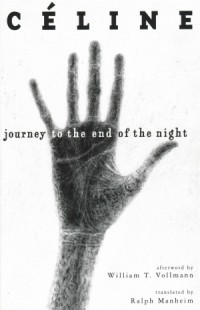 Journey to the End of the Night
Journey to the End of the Night
by Louis-Ferdinand Céline
New Directions, 2006
464 pages / $17.95 buy from New Directions
1. Will Self compared Joyce’s life before Ulysses to Céline’s experience in the war before writing Journey, in his exquisite discussion of the book upon some anniversary publication in The New York Times. I think I read that review about halfway through the novel and it complimented the thing quite well, gave a necessary contemporary slant on the whole thing.
2. Though remembered—much like Knut Hamsun—for his anti-Semitism (later in life) before his talents as an author after so many years gone by, a return to Céline and this novel in particular has occurred among authors and intellectuals almost every decade since its publication in 1932.
3. A new sort of manic transcription of the author’s experiences through his protagonist Ferdinand Bardamu jettisons the reader from war-torn France into the jungles of colonial Africa (my absolute favorite portion of any picaresque I’ve ever read) to post WWI America and back to France without missing a beat and yet the effect is akin to a hammer pounding against your chest.
4. I’ve read the book on three occasions, the last of which I suppose I felt ready enough and barreled through it in a couple of days and felt the aforementioned chest pounding that I’ve never experienced reading another book.
5. Its second translator, Ralph Manheim, also translated Adolf Hitler’s Mein Kampf.
6. Every time I remember that this is Céline’s first novel a little part of me that used to believe in writing as a career dies, then runs itself over in some hellish ghost tank, and dies again.
7. Famous for his use of three dots (“…”) in the sprawling paragraphs of his books, Céline—to me—has created a new and perfectly original way of de-Salinger-izing your first bildungsroman and turning it into a strange fucked up masterpiece.
8. Here we have the antihero, and the antihero’s doppelganger (in so many words) Robinson, who comes out of nowhere after any number of times to keep the protagonist company while he evades work, wanders around like a lunatic, and speculates about the desperate stupidity of mankind.
9. Bardamu’s a fan of kids, however; this being one of the few hopeful characteristics of the man. He believes in them, the promise of a good future, that maybe—just maybe—they won’t wind up shit like every adult he sees around.
10. The simplest characterization of this book is to say that it’s a picaresque, which is valid, but feels like the largest slight inflicted upon a great work of literature since everyone said all that shit that one time about your favorite whoever the hell; so I don’t want to do that. I want to call it a bible for people with less-than-hope but more-than-pettiness who hope to suck the congealed blood from the wounds of a better life forgone in the name of money, or democracy, or the nuclear family; and those who read it needing that companionship, needing that sense that all is not lost just yet, you’ll find it here. READ MORE >
November 1st, 2012 / 12:09 pm
25 Points: Darling
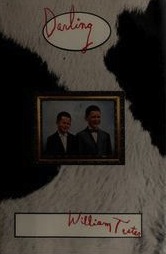 Darling
Darling
by William Tester
Knopf, 1992
177 pages / $9.95 buy from Amazon
1. “I have this room inside my head, a lightless, nightmare kind of room that I pretend is where I am. A smaller me sits in its darkness.”
2. “My mama in her mirror smiles at her, ahold of me, jewelry, makeup, mother, child. She pets my cowlick down and pats me gentle swattings on my butt. She’ll take or leave me– queen of us. She’s pretty. Mama lets me know that she’s the most loved one of us. I move for room to let her sit beside me, scoot across the stool. I’ll flirt for her; I’ll court, or woo her with my smallness. I’m this big: my head tops even with her dresser, with my hand to make a bridge. It feels like I’m this bunch or bundle, six potatoes in a bag. This pet. A useless tiny person, me so close down to the ground, potato legs and chest and elbows, with my big potato head.”
3. “Her hair reminds me then of boards.”
4. “Sometimes her neck is like an animal alive inside of her.”
5. “By now I’ve half decided how it is we’re going to die, Jeab gone to elsewhere in his liquor, me– I’ve wallowed on the thought that I’ll be shot down like a dog, or struck with bricks fell from a window, held and throttled while some killer smacks a hammer through my skull in a squirt of pain.”
6. “It wanders backwards lost and blinded toward an ant bed death to come. Me, I’m a giant to the bug. I wonder what its tiny mind is like, what nonsense it must live.”
7. “I hear the gyroings and gears inside the belly of the world, oily and in tar– and in the sky, the set chain of the wider all– turns.”
8. “A kind of line in me connects me to the gym and chilly stalls, a line that draws me like a toy across the sky between my arms, the flapping, thuddy noise of sprinters, shouting, fearful coughing me.”
9. “Chlorine and sneaker smells of feet the taste of pennies dew our air.”
10. “He butts his head bone in her bag like he is eating her from out of her or pulling out her blood.” READ MORE >
October 31st, 2012 / 1:09 pm
25 Points: And So
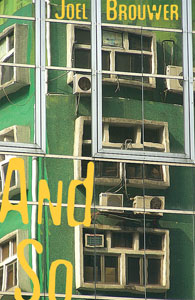 And So
And So
by Joel Brouwer
Four Way Books, 2009
88 pages / $15.95 buy from Four Way Books
1. And So was published in 2009, and so I’m reviewing it now, in 2012.
2. There’s always a time lapse in reading; and so we are all the silhouettes of each other’s ideas of fireflies.
3. Except: we aren’t all silhouettes of each other’s ideas of fireflies. Sometimes we cease to be apart and begin to be together in a way that is (and is not) like a dump cake. It is as Brouwer writes in “In a Motel Halfway to Omaha”: “At dawn she said she had to go to work and he / said not until I do it to you again slut / and she said ok whatever bad man and so” we go on with our dump cake selves.
4. People exist; people have sex. There are people in And So and so they have sex. A lot.
5. If And So were an album, it would be less Marvin Gaye’s Let’s Get It On and more Fiona Apple’s The Idler Wheel is Wiser Than the Driver of the Screw and Whipping Cords Will Serve You More Than Ropes Will Ever Do. And So is not a long title, and so it’s easier to say—which is more important than many things (like shallots).
6. And So is intimately concerned with its use of language, and so am I.
7. The cover art of And So is, to my mind, a series of frames, a series of ways of looking at things (read: people, relationships, the Mona Lisa). I am bothered by our inability to escape from frames, and so the cover art disturbs me.
8. As I break these thoughts to twenty-five pieces—as I frame them—I am wary of: the need for this review; the time that has elapsed between the publishing of this book and the writing of this review; the need for this form for this review; my place in this review; the book’s place in this review; if this review is actually even a review, or if it is a personal essay, co-opting this strange and lovely book of Brouwer’s for its (my) own purpose. I am wary, and so I do what I always do when I am wary: I tell you.
9. But if this were a personal essay, wouldn’t I tell you about my mother, her schizophrenia? I’m not telling you, and so it can’t be a personal essay.
10. But now I’ve told you, and so it must be. Perhaps it always is/was. READ MORE >
October 30th, 2012 / 8:05 pm

